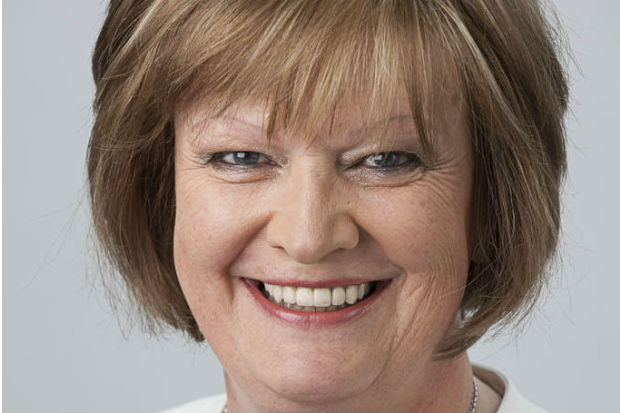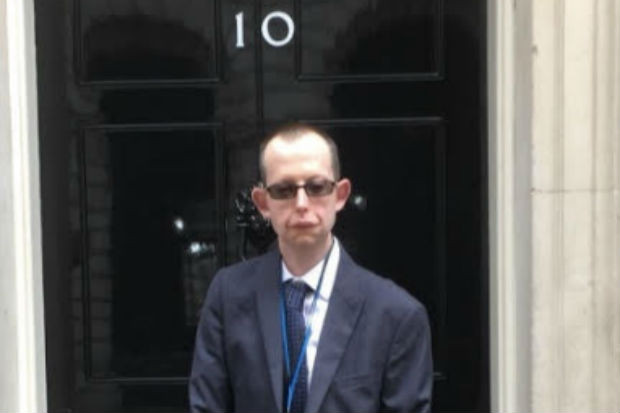Personal disability stories: 11 – Julia’s and Andy’s stories
By Julia & Andy | GOV.UK, May 22, 2019
Julia Walsh, Financial Reporting Council

Action on Hearing Loss estimates there are about 11 million people in the UK with some level of hearing loss. Many people go undiagnosed, failing to realise they are missing out on certain sounds.
About three years ago, I was listening to the radio while lying in bed and realised I could only hear on one side. I was diagnosed with otosclerosis, a form of hearing loss where the small bones in the middle ear effectively become fused and unable to vibrate properly. Both ears are now affected to differing extents. I also have tinnitus, the perception of noises that have no external source.
Losing my hearing has not been a simple case of things getting quieter. Different pitches and frequencies are impacted very differently. My asymmetrical hearing loss means I cannot tell what direction a noise is coming from. This is most noticeable when trying to find my mobile phone. Thankfully, I can block the tinnitus out most of the time, as for me it is like office white noise. But I never have silence.
At work, I can really struggle in some meetings. I need to sit in the right place to catch all the conversation. Larger meetings and training are another challenge. Colleagues may think I am keen, sitting near the front, but I am just trying to hear! Another difficulty arises when speakers do not use the microphones provided. Individuals with hearing loss may have purposely sat near the speakers, and a loud voice is no substitute. Also, many conference venues have a hearing loop – this transmits sound directly into certain types of hearing aid. If the microphones provided are not used, the benefit of the loop is lost.
I was prescribed a hearing aid early this year. I should use it all the time so that my brain relearns how to filter noise. It immediately made meetings much easier, but working in an open plan environment is more difficult, as everything is amplified. So, I was given a ‘mute’ option. I am still working on optimising the settings with my audiologist. I’ve also discovered ways of using my phone to help me. Phone calls with ear buds (earphones) are currently much easier than using my hearing aid, and it is also possible to use the phone as a speaker system.
If you find yourself often turning up the volume, or asking people to repeat things, I would definitely recommend getting a hearing test. While I am in the foothills of life with a hearing aid, I know that getting to grips with it now should make my life easier in the future.
Andy Wight, Competition and Markets Authority

As a child I was an avid reader. One book that made a lasting impression was ‘Yes Minister Diaries’ and sparked a lifelong interest in politics. I was confident that, if I worked hard enough, I too could work in Whitehall.
Finding out I had a rare genetic illness that would eventually take my hearing made me scale back my ambitions. I assumed that there was no future for me in Whitehall. Training as a teacher seemed to be a more stable choice. I had six great years as a teacher and head of department before my hearing finally and very quickly gave up.
Applying to the Civil Service Fast Stream on a whim seemed to be a long shot.
From the outset, things were different; the recruiters were genuinely interested in what I had to say. They were proactive in supporting me through the recruitment process and recognised a potential that I had forgotten I had. With their support and encouragement, I gained a place on the Fast Stream. It looked like I was off to Whitehall after all.
Starting in a new organisation, surrounded by strangers and in a new profession, is daunting enough. Starting there when you cannot hear anything was terrifying.
Whilst my new employers were happy to organise any support I needed, neither of us knew what was available in the highly sensitive environment I was now working in. We tried notetakers, volunteer scribes, on-site palantypists, and even frantically scribbling on post-it notes. After six months, I was introduced to Lipspeaker UK and found that lipspeaking works best for me.
Last year, I finished the Fast Stream and a Master’s Degree, and now work in the Competition and Markets Authority (CMA) as a Senior HR Business Partner. From the word go, my new team at CMA have been welcoming, open, honest and flexible, because they already knew what support I needed.
Since I joined the Civil Service, I have met many more hard-of-hearing and deaf colleagues. I have used my contacts and experiences to help co-found the Civil Service Deaf and Hard of Hearing Network.
Andy and Julia have suggested some helpful communication top tips here for communicating with a colleague who is deaf or hard of hearing, which you can read here.
About This Article:
A Life Worth Living has copied the content of this article under fair use in order to preserve as a post in our resource library for preservation in accessible format. Explicit permission pending.
Link to Original Article: https://civilservice.blog.gov.uk/2019/05/22/personal-disability-stories-11-julias-and-andys-stories/

